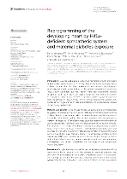| dc.contributor.author | Kolesová, Hana | |
| dc.contributor.author | Hrabalová, Petra | |
| dc.contributor.author | Bohuslavova, Romana | |
| dc.contributor.author | Abaffy, Pavel | |
| dc.contributor.author | Fabriciova, Valeria | |
| dc.contributor.author | Sedmera, David | |
| dc.contributor.author | Pavlinkova, Gabriela | |
| dc.date.accessioned | 2024-03-07T08:10:33Z | |
| dc.date.available | 2024-03-07T08:10:33Z | |
| dc.date.issued | 2024 | |
| dc.identifier.uri | https://hdl.handle.net/20.500.14178/2369 | |
| dc.description.abstract | Introduction: Maternal diabetes is a recognized risk factor for both short-term and long-term complications in offspring. Beyond the direct teratogenicity of maternal diabetes, the intrauterine environment can influence the offspring's cardiovascular health. Abnormalities in the cardiac sympathetic system are implicated in conditions such as sudden infant death syndrome, cardiac arrhythmic death, heart failure, and certain congenital heart defects in children from diabetic pregnancies. However, the mechanisms by which maternal diabetes affects the development of the cardiac sympathetic system and, consequently, heightens health risks and predisposes to cardiovascular disease remain poorly understood. Methods and results: In the mouse model, we performed a comprehensive analysis of the combined impact of a Hif1a-deficient sympathetic system and the maternal diabetes environment on both heart development and the formation of the cardiac sympathetic system. The synergic negative effect of exposure to maternal diabetes and Hif1a deficiency resulted in the most pronounced deficit in cardiac sympathetic innervation and the development of the adrenal medulla. Abnormalities in the cardiac sympathetic system were accompanied by a smaller heart, reduced ventricular wall thickness, and dilated subepicardial veins and coronary arteries in the myocardium, along with anomalies in the branching and connections of the main coronary arteries. Transcriptional profiling by RNA sequencing (RNA-seq) revealed significant transcriptome changes in Hif1a-deficient sympathetic neurons, primarily associated with cell cycle regulation, proliferation, and mitosis, explaining the shrinkage of the sympathetic neuron population. Discussion: Our data demonstrate that a failure to adequately activate the HIF-1α regulatory pathway, particularly in the context of maternal diabetes, may contribute to abnormalities in the cardiac sympathetic system. In conclusion, our findings indicate that the interplay between deficiencies in the cardiac sympathetic system and subtle structural alternations in the vasculature, microvasculature, and myocardium during heart development not only increases the risk of cardiovascular disease but also diminishes the adaptability to the stress associated with the transition to extrauterine life, thus increasing the risk of neonatal death. | en |
| dc.language.iso | en | |
| dc.relation.url | https://doi.org/10.3389/fendo.2024.1344074 | |
| dc.rights | Creative Commons Uveďte původ 4.0 International | cs |
| dc.rights | Creative Commons Attribution 4.0 International | en |
| dc.title | Reprogramming of the developing heart by Hif1a-deficient sympathetic system and maternal diabetes exposure | en |
| dcterms.accessRights | openAccess | |
| dcterms.license | https://creativecommons.org/licenses/by/4.0/legalcode | |
| dc.date.updated | 2024-05-07T12:40:42Z | |
| dc.subject.keyword | mouse model | en |
| dc.subject.keyword | maternal diabetes | en |
| dc.subject.keyword | coronary arteries | en |
| dc.subject.keyword | sympathetic neurons | en |
| dc.subject.keyword | cardiac sympathetic system | en |
| dc.identifier.eissn | 1664-2392 | |
| dc.relation.fundingReference | info:eu-repo/grantAgreement/MSM//LX22NPO5104 | |
| dc.relation.fundingReference | info:eu-repo/grantAgreement/UK/GAUK/GAUK160122 | |
| dc.relation.fundingReference | info:eu-repo/grantAgreement/MSM/LM/LM2018129 | |
| dc.relation.fundingReference | info:eu-repo/grantAgreement/MSM/EF/EF18_046/0016045 | |
| dc.date.embargoStartDate | 2024-05-07 | |
| dc.type.obd | 73 | |
| dc.type.version | info:eu-repo/semantics/publishedVersion | |
| dc.identifier.doi | 10.3389/fendo.2024.1344074 | |
| dc.identifier.utWos | 001186659800001 | |
| dc.identifier.eidScopus | 2-s2.0-85188125317 | |
| dc.identifier.obd | 645927 | |
| dc.identifier.pubmed | 38505753 | |
| dc.subject.rivPrimary | 30000::30100::30106 | |
| dcterms.isPartOf.name | Frontiers in Endocrinology | |
| dcterms.isPartOf.issn | 1664-2392 | |
| dcterms.isPartOf.journalYear | 2024 | |
| dcterms.isPartOf.journalVolume | 15 | |
| dcterms.isPartOf.journalIssue | March | |
| uk.faculty.primaryId | 108 | |
| uk.faculty.primaryName | 1. lékařská fakulta | cs |
| uk.faculty.primaryName | First Faculty of Medicine | en |
| uk.faculty.secondaryId | 115 | |
| uk.faculty.secondaryName | Přírodovědecká fakulta | cs |
| uk.faculty.secondaryName | Faculty of Science | en |
| uk.department.primaryId | 1488 | |
| uk.department.primaryName | Anatomický ústav 1. LF UK | cs |
| uk.department.primaryName | Institute of Anatomy | en |
| uk.department.secondaryId | 1034 | |
| uk.department.secondaryId | 1035 | |
| uk.department.secondaryName | Katedra genetiky a mikrobiologie | cs |
| uk.department.secondaryName | Department of Genetics and Microbiology | en |
| uk.department.secondaryName | Katedra buněčné biologie | cs |
| uk.department.secondaryName | Department of Cell Biology | en |
| dc.type.obdHierarchyCs | ČLÁNEK V ČASOPISU::článek v časopisu::původní článek | cs |
| dc.type.obdHierarchyEn | JOURNAL ARTICLE::journal article::original article | en |
| dc.type.obdHierarchyCode | 73::152::206 | en |
| uk.displayTitle | Reprogramming of the developing heart by Hif1a-deficient sympathetic system and maternal diabetes exposure | en |

